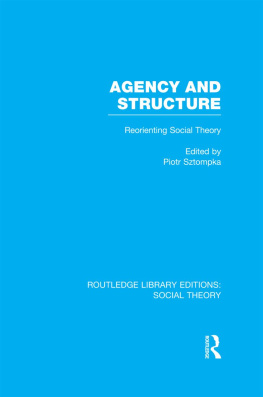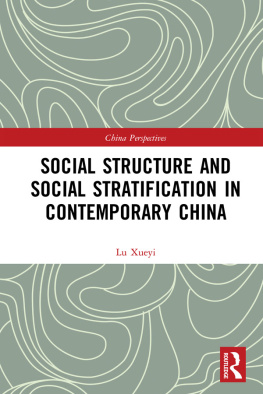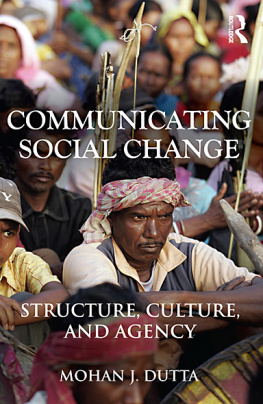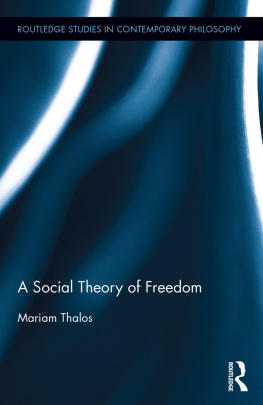ROUTLEDGE LIBRARY EDITIONS: SOCIAL THEORY
Volume 2
AGENCY AND STRUCTURE
AGENCY AND STRUCTURE
Reorienting Social Theory
Edited by
PIOTR SZTOMPKA
First published in 1994
This edition first published in 2015
by Routledge
2 Park Square, Milton Park, Abingdon, Oxon, OX14 4RN
and by Routledge
711 Third Avenue, New York, NY 10017
Routledge is an imprint of the Taylor & Francis Group, an informa business
1994 OPA (Amsterdam) B.V.
All rights reserved. No part of this book may be reprinted or reproduced or utilised in any form or by any electronic, mechanical, or other means, now known or hereafter invented, including photocopying and recording, or in any information storage or retrieval system, without permission in writing from the publishers.
Trademark notice: Product or corporate names may be trademarks or registered trademarks, and are used only for identification and explanation without intent to infringe.
British Library Cataloguing in Publication Data
A catalogue record for this book is available from the British Library
ISBN: 978-0-415-72731-0 (Set)
eISBN: 978-1-315-76997-4 (Set)
ISBN: 978-1-138-78200-6 (Volume 2)
eISBN: 978-1-315-76387-3 (Volume 2)
Publishers Note
The publisher has gone to great lengths to ensure the quality of this reprint but points out that some imperfections in the original copies may be apparent.
Disclaimer
The publisher has made every effort to trace copyright holders and would welcome correspondence from those they have been unable to trace.
AGENCY AND STRUCTURE
Reorienting Social Theory
Edited by
Piotr Sztompka
Copyright 1994 by OPA (Amsterdam) B.V. All rights reserved. Published under license by Gordon and Breach Science Publishers S. A.
Gordon and Breach Science Publishers
Y-Parc
Chemin de la Sallaz
1400 Yverdon, Switzerland
Private Bag 8
Camberwell, Victoria 3124
Australia
12 Cour Saint-Eloi
75012 Paris
France
Christburger Str. 11
10405 Berlin
Germany
Post Office Box 90
Reading, Berkshire RG1 8JL
Great Britain
3-14-9, Okubo
Shinjuku-ku, Tokyo 169
Japan
Emmaplein 5
1075 AW Amsterdam
Netherlands
820 Town Center Drive
Langhorne, Pennsylvania 19047
United States of America
Library of Congress Cataloging-in-Publication Data
Agency and structure : reorienting social theory / edited by Piotr Sztompka.
p. cm. (International studies in global change, ISSN 1055-7180; v. 4)
Revised versions of papers presented at the World Congress of Sociology held in 1990 in Madrid.
Includes bibliographical references and index.
ISBN 2-88124-592-7 (hardcover) 2-88124-597-8 (softcover)
1. Sociology. 2. Sociology-Philosophy. 3. Social action. 4. Social structure. I. Sztompka, Piotr. II. Series.
HM24.A35 1993
301dc20
93-19945
CIP
No part of this book may be reproduced or utilized in any form or by any means, electronic or mechanical, including photocopying and recording, or by any information storage or retrieval system, without permission in writing from the publisher. Printed in the United States of America.
CONTENTS
George Ritzer and Pamela Gindoff
|
Piotr Sztompka
|
Elisa P. Reis
|
Miguel A. Cainzos
|
Franco Crespi
|
Francois Chazel
|
Craig Calhoun
|
Tom R. Burns
|
Piotr Sztompka
|
Gran Therborn
|
This book series brings together under one banner works by scholars of many disciplines. All of these researchers have distinguished themselves in their specialties. But here they have ventured beyond the frontiers of traditional disciplines and have developed new, innovative approaches to the study of social systems and social change.
Why? What has prompted this foray into uncharted territory? What is the reason for broadening theoretical perspectives and developing new methodologies? The impetus comes from the world we seek to understand. Scholars have traditionally made boundary assumptions that limited their scope of inquiry to the concerns of a discipline. Such limitations facilitate concentration, though they have always been artificial. The interpenetration of social, economic and environmental phenomena, and the precipitous pace of change in the late twentieth century make it clear that such convenient intellectual boundaries are not only unrealistic, they are untenable.
In the last quarter of the twentieth century, social theory is radically transforming as we develop insights into the rapidly changing human condition. This volume is a key contribution to that emergence of new social theory. By drawing on contributors from a broad diversity of nations and intellectual traditions, it reflects the globalization of social theory, too long an Anglo-European province. And it wrestles with an issue at the heart of contemporary theory: the problem of human agency. Human agency is central in the dynamics of the contemporary world, and the concept of agency is producing equally important innovations in social theory. This volume offers a global perspective on agency, bringing together the contributions of the finest scholars wrestling with this difficult but critical theoretical issue. We are proud to offer it as the fourth volume in this series.
How complex waves of change sweep through the contemporary world, altering the natural environment, technology, the economy and social systems; the interaction of these forces, their impact on nations, communities, families and individuals; and the response to them by individuals and collectivities this is the focus of the research to be presented in this series. The scholars writing in the series are themselves engaged in social change the restructuring of our way of thinking about the world.
Tom R. Burns
Thomas Dietz
The Return of Grand Theory
Nine years have passed since Quentin Skinner heralded the return of grand theory in the social sciences (Skinner 1985). Today it seems even more obvious. We are witnessing the true renaissance of theoretical thinking.
In this century, the attitudes toward general theory have gone through various phases. We had the Poverty of Theory period dominated by narrow-empiricism and the absurd accusation of theory for being metaphysical. We had the Crisis of Theory period marked by disenchantment with proliferating, polarized, mutually exclusive theories (Eisenstadt and Curelaru 1976; Sztompka 1979). Hopefully, we have left both of these phases behind. At the end of this century we find ourselves in the Return to Theory period, and facing the fundamental Reorientation of Sociological Theory.







